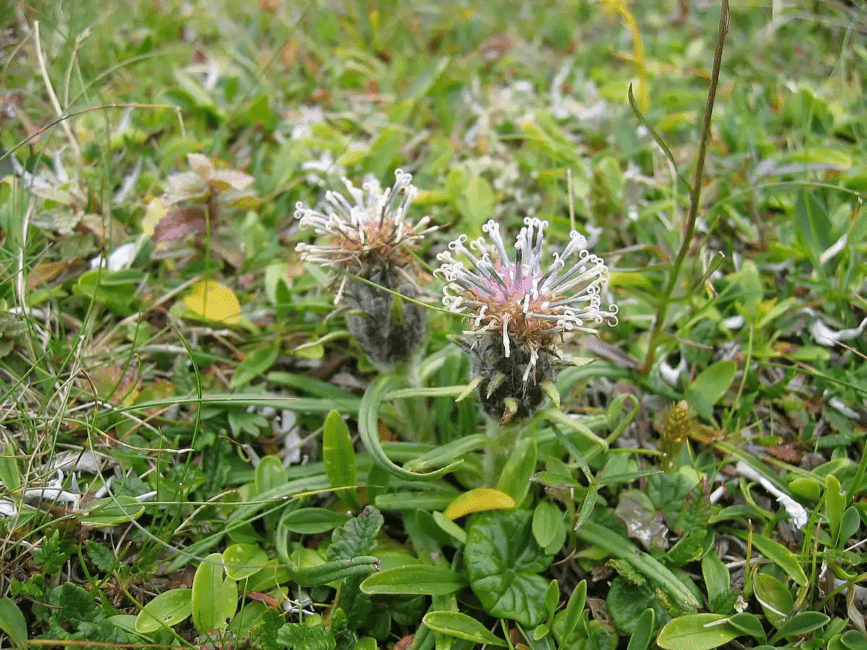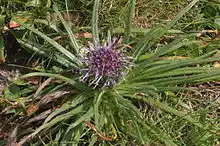Saussurea, commonly known as Snow Lotus, is a remarkable genus of flowering plants found in the high-altitude regions of the Himalayas, Tibet, and other mountainous areas in Asia. This alpine beauty is renowned for its stunning appearance and numerous medicinal properties.
Snow Lotus is characterized by its strikingly white or pale yellow blossoms that resemble delicate, pristine snowflakes, which is how it earned its common name.
Its ethereal beauty contrasts sharply with the harsh and rugged environments where it thrives, often above 4,000 meters in elevation. This tenacity to survive in extreme conditions is emblematic of Snow Lotus.
Beyond its aesthetic appeal, Snow Lotus has been a valuable resource in traditional Asian medicine for centuries. The plant is believed to possess a wide range of healing properties, which include anti-inflammatory, analgesic, and anti-oxidative effects. It is used to treat various ailments, such as respiratory issues, joint pain, and gastrointestinal problems.
Saussurea, or Snow Lotus, is not only a symbol of endurance and beauty in adversity but also a source of natural remedies deeply rooted in the traditions of the regions where it grows.
Its resilience and therapeutic potential make it a remarkable and revered plant in high-altitude ecosystems.
The Botanical Description of Saussurea
Saussurea is a genus of flowering plants known for its remarkable and diverse botanical characteristics:
1. Growth Habit: Saussurea species vary in growth habits, including herbaceous perennials and low shrubs. They are often characterized by their erect or ascending stems covered with simple or glandular hairs.
2. Leaves: The leaves of Saussurea are usually alternate and pinnately divided. They can range in size from small and lance-shaped to larger, broader leaves, depending on the species.
3. Flowers: Saussurea is renowned for its distinctive and often striking flower heads. These flower heads can vary in color, with shades of blue, purple, and white being common. They are typically composite, composed of numerous individual florets.
4. Inflorescence: The flower heads of Saussurea are grouped together in inflorescences. These inflorescences may form solitary heads or be arranged in clusters, depending on the species.
5. Root System: Saussurea species can develop robust and extensive root systems, which help them thrive in various environmental conditions, including high altitudes and challenging soils.
6. Habitat: Saussurea is commonly found in mountainous regions, especially in the Himalayas, the Alps, and the Rockies. They are well-adapted to cold, alpine climates.
The Geographic Distribution of Saussurea
Saussurea exhibits a wide and diverse geographic distribution:
1. Himalayan Region: Saussurea species are prevalent in the Himalayan mountain range, spanning across countries like India, Nepal, Bhutan, and Tibet. They are often found at high altitudes, where they have adapted to extreme cold and arid conditions.
2. Alpine Europe: In Europe, Saussurea species are commonly found in alpine regions, including the Alps and the Pyrenees. These plants thrive in rocky terrains and can withstand harsh mountain climates.
3. North America: Some Saussurea species are native to North America, particularly in the Rocky Mountains. They are well-suited to high-altitude environments and are known for their distinctive appearance.
4. Asia: Beyond the Himalayas, Saussurea can also be found in various parts of Asia, including China, Siberia, and Japan. Their adaptability to diverse environmental conditions has enabled them to spread across this continent.
5. Other Regions: Saussurea is also present in other mountainous regions, including the Andes in South America, the Atlas Mountains in North Africa, and the mountains of Central Asia.
The Chemical Composition of Saussurea
Saussurea plants are known to contain a variety of chemical compounds with potential medicinal and biological significance:
1. Sesquiterpene Lactones: Many Saussurea species are rich in sesquiterpene lactones, which are known for their anti-inflammatory and antioxidant properties. These compounds have been studied for their potential in treating various health conditions.
2. Flavonoids: Flavonoids are secondary metabolites found in Saussurea plants. They have antioxidant and anti-inflammatory properties and are associated with a range of health benefits.
3. Alkaloids: Some Saussurea species contain alkaloids, which may have pharmacological properties and are of interest in medical research.
4. Essential Oils: Saussurea plants are known for their essential oils, which can have aromatic and therapeutic qualities. These oils are used in traditional medicine and aromatherapy.
5. Polyacetylenes: Certain Saussurea species contain polyacetylenes, which have been studied for their potential antibacterial and anti-inflammatory effects.
6. Polysaccharides: Polysaccharides found in Saussurea species may have immunomodulatory properties, making them a subject of research in the field of herbal medicine.
The unique botanical description, geographic distribution, and chemical composition of Saussurea plants contribute to their ecological significance and their potential in traditional and modern medicine. These plants continue to captivate botanists, researchers, and nature enthusiasts alike with their rich diversity and adaptability.
Read Also: Are Snakes Good or Bad and What Do Snakes Eat? Find Out
The Medicinal Health Benefits Of Saussurea (Snow Lotus)

Saussurea, commonly known as snow lotus or costus, is revered for its remarkable medicinal properties. Here are 16 key health benefits associated with this plant:
1. Anti-Inflammatory: Saussurea exhibits potent anti-inflammatory effects, making it valuable in treating various inflammatory conditions, such as arthritis and muscle sprains.
2. Respiratory Health: It can help alleviate respiratory issues, such as coughs, asthma, and bronchitis, promoting clearer breathing.
3. Immune System Boost: Regular consumption of Saussurea can strengthen the immune system, making the body more resilient against infections and diseases.
4. Digestive Aid: Saussurea promotes a healthy digestive system, relieving indigestion and gastrointestinal discomfort.
5. Antioxidant Properties: The plant’s rich antioxidant content helps neutralize harmful free radicals in the body, reducing oxidative stress and lowering the risk of chronic diseases.
6. Pain Relief: Saussurea is known for its analgesic properties, providing natural pain relief for conditions like headaches, migraines, and joint pain.
7. Cardiovascular Support: It supports heart health by regulating blood pressure, improving blood circulation, and reducing the risk of cardiovascular diseases.
8. Stress Reduction: Saussurea’s calming effects assist in reducing stress and anxiety, promoting relaxation and mental well-being.
9. Diabetes Management: Studies suggest that this plant can help regulate blood sugar levels, making it beneficial for individuals with diabetes.
10. Skin Health: The plant’s extracts are used in skincare products due to their ability to soothe irritation, reduce inflammation, and promote healthy skin.
11. Menstrual Pain Relief: Saussurea can alleviate menstrual pain and discomfort, providing relief to women during their menstrual cycle.
12. Cognitive Health: It supports brain function, enhancing memory, focus, and cognitive abilities, potentially reducing the risk of neurodegenerative diseases.
13. Wound Healing: The plant’s extracts have been traditionally used for wound healing, promoting faster recovery and reducing the risk of infections.
14. Gastrointestinal Disorders: Saussurea can be used to alleviate symptoms of gastrointestinal disorders, such as irritable bowel syndrome (IBS) and gastritis.
15. Anti-microbial Properties: It exhibits antimicrobial effects, inhibiting the growth of harmful bacteria and fungi in the body.
16. Liver Detoxification: Saussurea aids in detoxifying the liver, promoting its optimal functioning and overall body detoxification.
The Methods of Usage to Achieve the Provided Health Benefits Of Saussurea (Snow Lotus)
1. Herbal Teas: Prepare herbal teas by steeping Saussurea leaves or dried flowers in hot water. This method is effective for providing digestive and stress-relief benefits.
2. Tinctures: Tinctures are alcohol-based extracts, providing a concentrated form of the plant’s medicinal properties. They can be taken in small doses for various health benefits.
3. Poultices: Create poultices by crushing fresh Saussurea leaves and applying them directly to wounds or inflamed areas for their healing properties.
4. Capsules and Supplements: Saussurea supplements, available in capsule form, offer a convenient way to incorporate its health benefits into daily routines.
5. Aromatherapy: Essential oils derived from Saussurea can be used in aromatherapy, promoting relaxation, stress reduction, and mental well-being.
6. Culinary Uses: Incorporate Saussurea leaves or flowers into culinary dishes, enhancing flavor while providing health benefits. Use them in salads, soups, or stews.
7. Topical Creams: Saussurea extracts are used in topical creams and ointments, providing relief from pain, inflammation, and skin conditions.
8. Inhalation: Inhaling the steam infused with Saussurea extracts can relieve respiratory issues, promoting clear breathing and respiratory health.
The Side Effects Of Using Saussurea Medicinal Plant
1. Allergic Reactions: Some individuals may be allergic to Saussurea, experiencing allergic reactions such as rashes, itching, or swelling upon contact or ingestion.
2. Digestive Discomfort: In some cases, excessive consumption of Saussurea may lead to digestive discomfort, including nausea, vomiting, or diarrhea.
3. Interaction with Medications: Saussurea may interact with certain medications. It is essential to consult a healthcare professional, especially if you are taking prescribed drugs.
4. Pregnancy and Breastfeeding: Pregnant or breastfeeding women should avoid Saussurea, as its effects on fetal development and infants are not well-studied.
5. Photosensitivity: Some individuals may experience increased sensitivity to sunlight after using products containing Saussurea extracts.
6. Blood Pressure Regulation: Saussurea can affect blood pressure. Individuals with hypertension should use it cautiously and under medical supervision.
7. Gastric Irritation: Excessive use of Saussurea may cause gastric irritation, leading to discomfort and acid reflux in some individuals.
8. Skin Sensitivity: Direct contact with Saussurea leaves or extracts may cause skin sensitivity in certain individuals, especially those with sensitive skin types.
It is crucial to consult a healthcare professional before using Saussurea for medicinal purposes, especially if you have underlying health conditions or are taking
Read Also: How to start a Vertical Farm: A Comprehensive Guide
The Scientific Research and Studies of Saussurea (Snow Lotus)

Scientific research and studies on Saussurea have unveiled various aspects of this remarkable plant:
1. Antioxidant Research: Studies have explored the antioxidant properties of Saussurea, indicating its potential to combat oxidative stress and its implications for overall health.
2. Anti-Inflammatory Effects: Research has examined the plant’s anti-inflammatory effects, elucidating its mechanisms and its potential use in treating inflammatory conditions.
3. Antimicrobial Properties: Scientists have investigated the antimicrobial properties of Saussurea, highlighting its ability to inhibit the growth of harmful microorganisms.
4. Medicinal Compounds: Researchers have identified and isolated various compounds within Saussurea, such as sesquiterpene lactones, flavonoids, and essential oils, contributing to its medicinal properties.
5. Phytochemical Analysis: Phytochemical analyses have been conducted to determine the plant’s chemical composition, providing insights into its therapeutic potential.
The Safety Precautions and Recommendations In Using Saussurea (Snow Lotus) Medicinal Plant
To ensure safe and effective use of Saussurea, consider the following safety precautions and recommendations:
1. Allergies: Individuals with known plant allergies should exercise caution when using Saussurea and seek medical advice if allergic reactions occur.
2. Dosage: Follow recommended dosage guidelines and avoid excessive consumption, as it may lead to digestive discomfort or other adverse effects.
3. Interaction with Medications: Consult with a healthcare professional before using Saussurea, especially if you are taking medications, as it may interact with certain drugs.
4. Pregnancy and Breastfeeding: Pregnant and breastfeeding women should avoid Saussurea due to limited safety data in these cases.
5. Photosensitivity: Be aware of potential photosensitivity after using products containing Saussurea extracts and take precautions when exposed to sunlight.
6. Hypertension: Individuals with high blood pressure should use Saussurea cautiously, as it may affect blood pressure levels.
7. Skin Sensitivity: Direct contact with Saussurea leaves or extracts may cause skin sensitivity in some individuals, particularly those with sensitive skin.
8. Gastric Irritation: Excessive use of Saussurea may lead to gastric irritation and acid reflux in some individuals.
FAQs About Saussurea (Snow Lotus) Medicinal Plant
1. What are the primary health benefits of Saussurea (Snow Lotus)?
Saussurea offers a range of benefits, including anti-inflammatory, antioxidant, pain relief, and immune-boosting properties.
2. How can I use Saussurea for pain relief?
Saussurea can be used in the form of herbal teas, tinctures, or topical creams to alleviate pain.
3. Are there any side effects associated with using Saussurea?
Some individuals may experience allergic reactions, digestive discomfort, or interactions with medications. It’s important to exercise caution.
4. Is Saussurea safe during pregnancy and breastfeeding?
It is recommended to avoid Saussurea during pregnancy and breastfeeding due to limited safety data.
5. Can Saussurea be used as a natural remedy for respiratory issues?
Yes, Saussurea has been traditionally used to alleviate respiratory problems like coughs and bronchitis.
6. What is the best way to include Saussurea in my diet?
You can incorporate it into your diet by using its leaves or flowers in salads, soups, and stews.
7. Is Saussurea effective against skin conditions?
Saussurea extracts are used in topical creams and ointments for their skin-soothing and anti-inflammatory properties.
8. Can Saussurea be used by individuals with diabetes?
Saussurea may help regulate blood sugar levels and can be considered as a natural remedy for individuals with diabetes.
9. Is it safe to use Saussurea for stress relief and anxiety?
Saussurea is known for its stress-reducing effects and can be used as a natural remedy for anxiety.
10. Are there ongoing studies on Saussurea for potential anti-cancer properties?
Research on the plant’s potential anti-cancer properties is still in progress, and more studies are needed to confirm these effects.
11. Can Saussurea be cultivated in home gardens?
Yes, Saussurea can be grown in suitable climate conditions and may be an intriguing addition to home gardens.
12. How should I store products containing Saussurea extracts?
Store them in a cool, dry place, away from direct sunlight, to maintain their efficacy.
13. Can Saussurea be used by children and the elderly?
It is advisable to consult with a healthcare professional for specific age-related recommendations.
14. What is the recommended daily dosage for Saussurea supplements?
Dosage may vary, but it is generally recommended to follow the instructions on the product label or consult with a healthcare provider.
15. Does Saussurea have any effects on cognitive function?
Some individuals report enhanced memory and cognitive function with regular use.
16. Is it safe to use Saussurea alongside other herbal supplements?
While it can be used with other herbal supplements, it’s essential to consult with a healthcare professional for potential interactions.
17. How long does it typically take to experience the benefits of Saussurea for various health conditions?
The timeframe may vary depending on the individual and the specific health condition being addressed. It’s advisable to monitor progress over several weeks to assess effectiveness.
These frequently asked questions aim to provide valuable insights into the safe and effective use of Saussurea for various health purposes, along with precautions and ongoing research in the field.
Read Also: Interesting Facts About Giraffe

